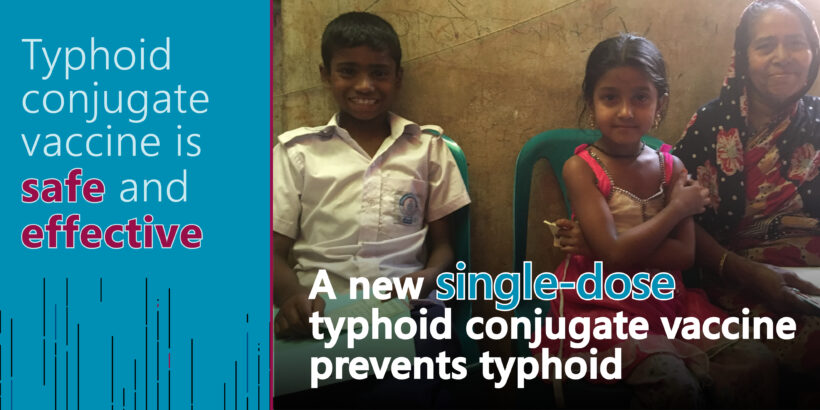To read this story in Bangla, click here.
This is a fictional story. All characters, events, and places are made up. However, the context in which families live, separated between the city and the village, with minimal access to clean, safe water and combating illness, is real. The situation described and the information about typhoid and typhoid conjugate vaccines (TCVs) are based on real-world experience and highlight the reality for children and families who stand to benefit from TCV.
Once again, Nazma is late leaving the factory where she works.
She steps out of the factory gate and glances up at the sky—dark already. A hot night in May. It must be past eight, though her shift was supposed to end at five. By the time she reaches home, it is nine.
She walks a few miles to get home. The moment Nazma enters her one-room rented place in the city she gulps down a glass of water straight from the tap. She knows she should boil it first, but she is so thirsty. It tastes odd—sour, with a strange smell. Probably the pipes cracked somewhere underground, seeping sewage into the water line. This wouldn’t be the first time.
She bought two eggs on her way home and now fries them into a quick curry. Her husband, Moti, hasn’t returned yet. His shift runs until ten. Nazma calls her mother-in-law in the village.
“Hello, Mother. Were you asleep?”
“Hello. No, I wasn’t. Your little one has had a fever since the afternoon.”
Nazma has two daughters, four and six years old, both living in the village with their grandmother. The elder has just started school. City life is too expensive for Nazma and her husband to keep the girls here.
“Is she sleeping now?”
“Yes. When will you visit? The holiday season is still far away, and we’re short of money. The older child has been going to school for a few months now. She keeps asking for snacks from the street food vendors—I can’t afford those.”
“Don’t let her eat street food, Mother. Remember what happened to their aunt? She died of typhoid as a child and everyone suspected it was from contaminated food. Right now their father has fever and stomach trouble. Our tap water smells awful. I’m worried it’s contaminated.”
“Is Moti home?”
“No, not yet. When he arrives, I’ll ask him to send you money for a doctor’s visit. Please don’t buy the girl food from street vendors; instead, prepare homemade meals for her.”
Nazma hung up the call.
Next door live three high school sisters who are often out, either at school or attending a tutoring academy. While they are away from home, they rely on street food vendors for their meals. As a result, they frequently fall ill. A few months back, the eldest contracted typhoid. After two months of antibiotics, she was too weak to visit her parents before her exams. That’s when Nazma realized the seriousness of typhoid. Now the girl is taking her exams, but she looks so frail. Nazma went over to chat.
“What are you cooking tonight?”
One of the sisters sighed. “Spinach and lentils. But how can we eat? The tap water stinks!”
“Yeah, I’ve noticed that too. I’ll tell my husband to buy a water filter—we’ll share it with you. You’ve suffered from illness enough already. You’re barely recovered from typhoid.”
“You know,” the girl said, “the government plans to administer a new typhoid vaccine known as the typhoid conjugate vaccine, or TCV, in all educational institutes. It will be free for everyone up to ninth grade—just by showing a birth certificate.”
Nazma asked her whether her daughters back in the village can get the vaccine.
“Yes, Sis. The government will administer the TCV to all kids from 9 months to 15 years old—in cities and villages—everywhere, free of charge. We’ll get ours at school. But for younger children, the vaccine will be available at community sites like vaccination centers— both the permanent and temporary ones.”
Back in her room, Nazma found her husband had returned from work and gone straight to bed, burning with fever. He wouldn’t eat.
Nazma wondered whether her husband might have typhoid too. He’d never been tested, just took some antibiotics from the drugstore. Sometimes the fever faded for a month, then returned.
She finished her chores. Before sleep took her, the thought of the new typhoid vaccine came back to her. Her sister-in-law had died from typhoid in the village when she was young. No one realized at that time what was happening. Now the TCV could protect her children.
It was now eleven at night. It was too late to call her mother-in-law in the village. But Nazma couldn’t wait until morning. She needed to tell her mother-in-law right away to get both her daughters vaccinated at the nearest EPI vaccination center back in the village once the TCV vaccination campaign began. She wanted to tell everyone about the safe and effective new typhoid vaccine. The entire neighborhood needed to know that it would soon be available, protecting children from typhoid!
The next morning, Nazma called her mother-in law. The phone rang. No answer yet. Nazma clenched her fists. She was eager to make sure her girls were protected against typhoid.



